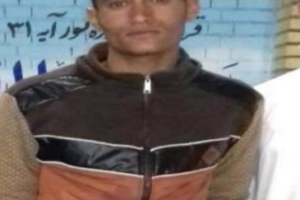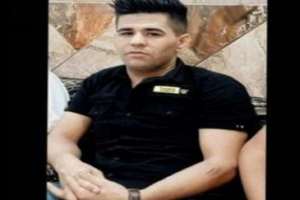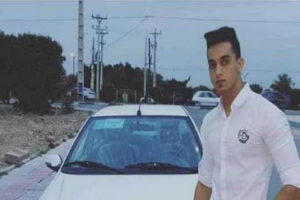Human rights groups have reported that Iranian regime forces shot another unarmed young Ahwazi man leaving him disabled and in a comatose state, with doctors unsure of whether he will regain consciousness. The victim, 24-year-old Rasoul Afrawi, was shot as he rode his motorcycle past a regime checkpoint in the regional capital Ahwaz on Monday, 19 August, with regime security officers opening fire at close range, shooting him once in the back and three times in his legs. Although he was taken to hospital, he lapsed into a coma as a result of the severe damage to his spinal cord and heavy internal bleeding, with medical staff at the hospital unsure of whether he will ever regain consciousness.

Rasoul’s traumatised parents are reportedly still in shock, telling local activists that their son had just gone out to buy bread and they were expecting him to return shortly, only to receive a call telling them that he had been shot by Basiji forces [plainclothes regime police]. They rushed to the hospital only to find that he had been left disabled and lapsed into a coma, and are now waiting to discover if he will recover.
This was the fourth such shooting within a week in which three of the other victims of the regime’s indiscriminate attacks were killed. In all the cases, the victims were unarmed and had committed no crime. In an attack on 16 August, soldiers from the regime’s infamous Islamic Revolutionary Guards Corps (IRGC) opened fire on two other young Ahwazi men as they rode a motorbike through the city of Fallehiyeh. One of the two, 28-year-old Bassem Al-Boughbish, died at the scene, while the other young man, identified as Salman Al-Boughbish, was critically wounded. The two victims were both unarmed, and no reason for the shooting or apology was given to the murdered man’s family.
In another case a few days before that, on 13 August, a young motorcyclist named Mohammed Oudeh Sari was chased and shot at close range by officers of the regime’s notorious Basiji, plainclothes police thugs who act with absolute impunity, as he was driving his motorcycle in the capital Ahwaz. He was taken to hospital but died of his injuries the next day.

Human rights activists, whose names have been withheld to protect their safety in Ahwaz, told the DIRS that Mohammed was shot after failing to stop at a recently erected checkpoint manned by Basiji militias in the city’s Al-Thawra neighbourhood (also known as Alawi), with reports indicating that the checkpoint had been set up in a poorly lit area and he had simply not been paying attention and missed seeing it.

The third extrajudicial killing happened on Sunday, 11 August 2019, as Iranian regime forces shot and murdered an unarmed 19-year-old Ahwazi Arab man identified as Abbas Amiri in his car as he and his cousin drove to visit friends for the Eid al-Adha holiday.
These are not unusual incidents; in recent months, regime military and security personnel have increased their already brutal persecution of Ahwazis in the region in an effort to terrorise the population into abandoning demands for freedom and human rights and protests against the regime abuses.
With many young Ahwazis using motorbikes and mopeds due to poverty and being unable to afford cars, fear is increasing among young men in particular as the regime attacks like these become more common.
For the regime, such attacks are another means of terrorising young Ahwazis into subservience, reminding them that the regime is not there to protect them but to control them. Young Ahwazis are also regularly randomly detained, imprisoned and tortured, including public floggings, simply to maintain the regime’s intimidation of the population, being charged with such ‘crimes’ as “waging war against God” with the only evidence being confessions extracted under torture, which is so severe that deaths are a common occurrence. Dissidents and activists who dare to speak out in support of human rights are routinely imprisoned for decades on similarly fabricated charges and often executed.
Ahwazi activists have sharply condemned the silence of international media and human rights organisations such as Amnesty International and Human Rights Watch towards the regime’s crimes, with a widespread view in Ahwaz that the regime is able to perpetrate crimes up to and including murder on a daily basis safe in the knowledge that it has absolute impunity provided by the international community.
There are increasing calls for urgent action by the United Nations bodies, starting with the Human Rights Council, to act decisively in holding the regime and its military and security bodies accountable for a policy which amounts to state terror against innocent Ahwazi civilians.
Under the current conditions, there is no hope of justice for victims of the regime forces’ regular extrajudicial killings and other crimes or any way for the victims’ families or survivors to hold the perpetrators to account. On the contrary, any effort by the survivors or the victims’ family members to bring the killers to justice is immediately rejected and countered by the regime with false accusations that those targeted were involved in crime or terrorist activities; despite there being no evidence for these scurrilous and obviously untrue allegations which add insult to injury for the traumatised survivors of these attacks and the families of those killed, there is no way to take any further action against the regime without the family members or survivors themselves being targeted.
By Rahim Hamid, an Ahwazi author, freelance journalist and human rights advocate. Hamid tweets under @Samireza42.
